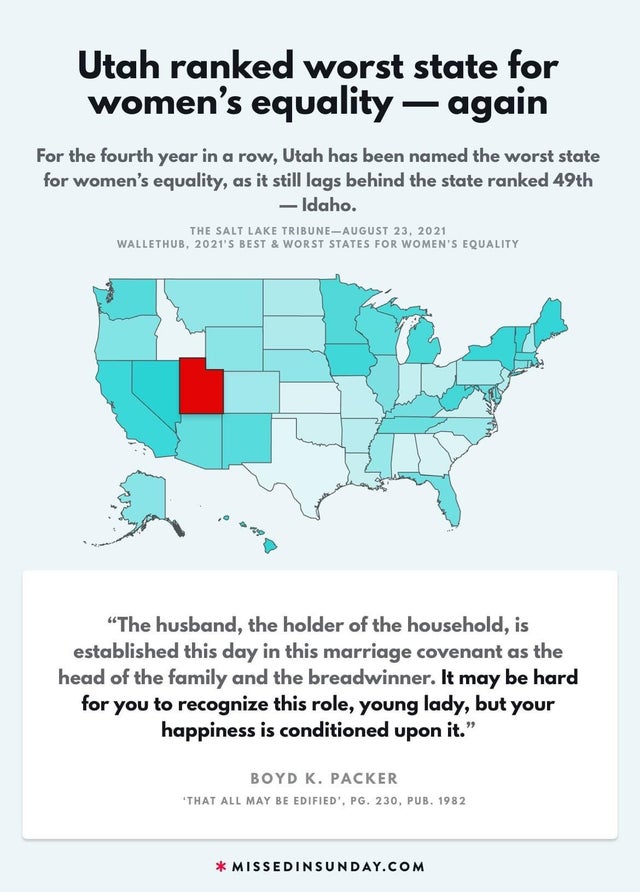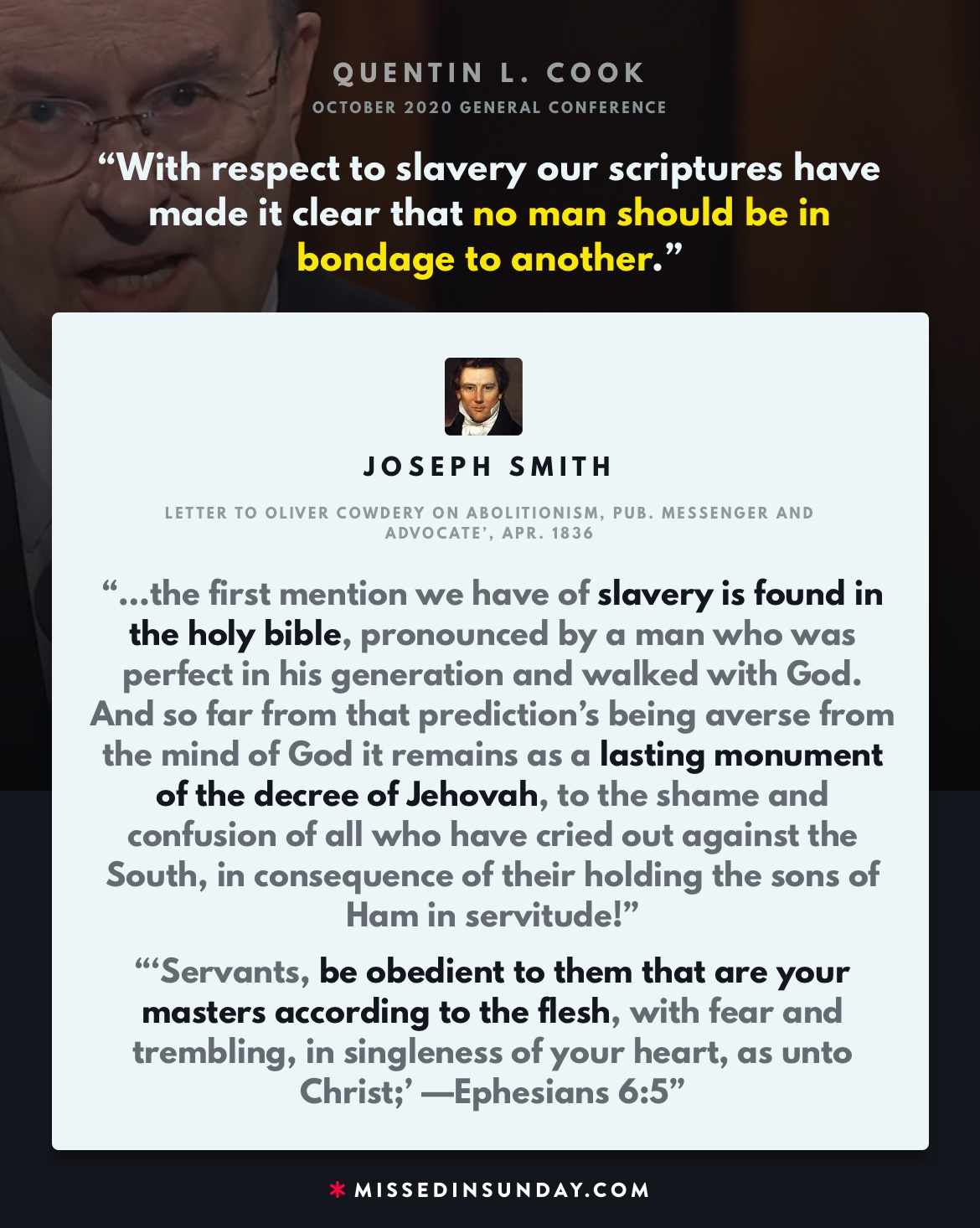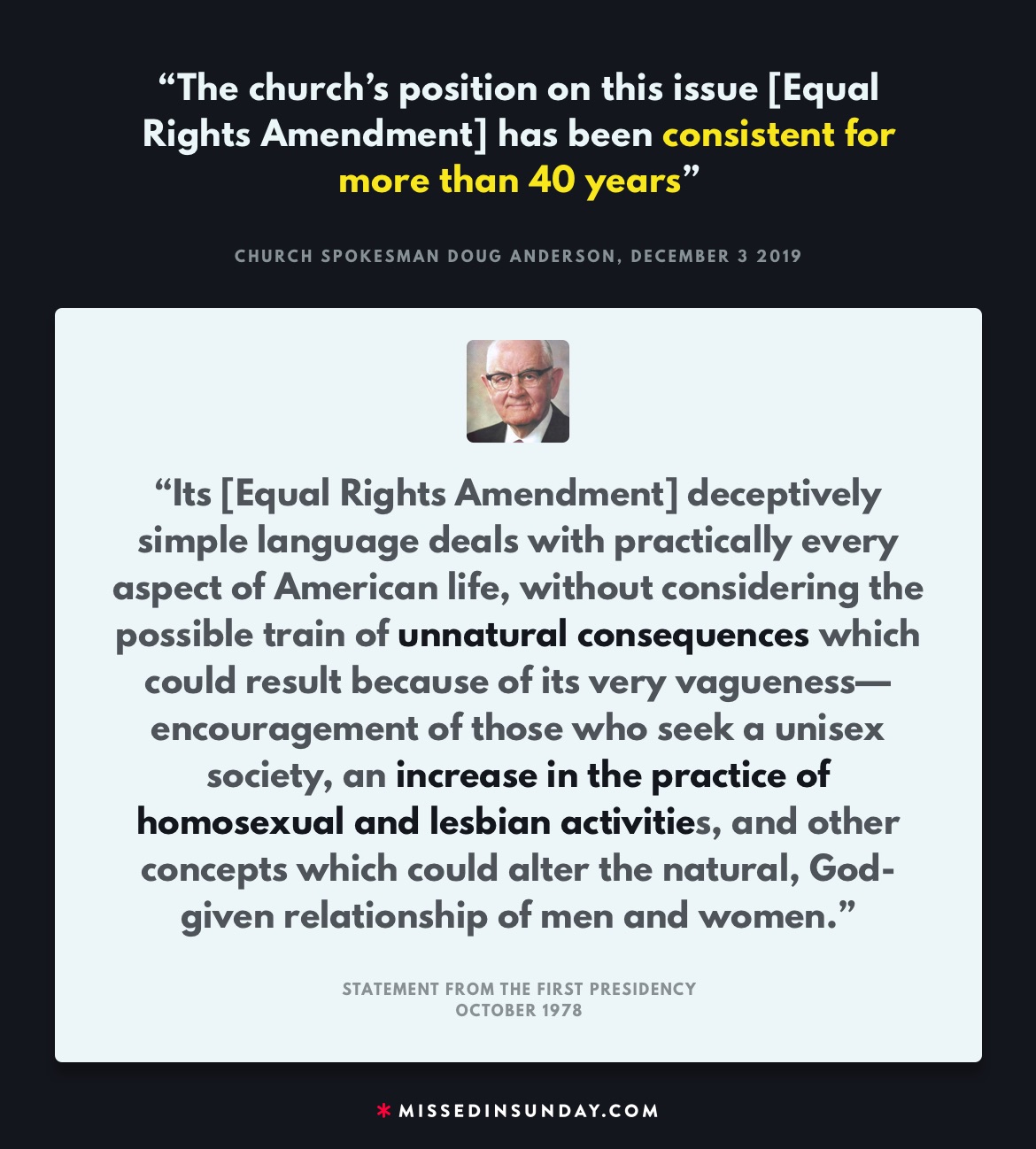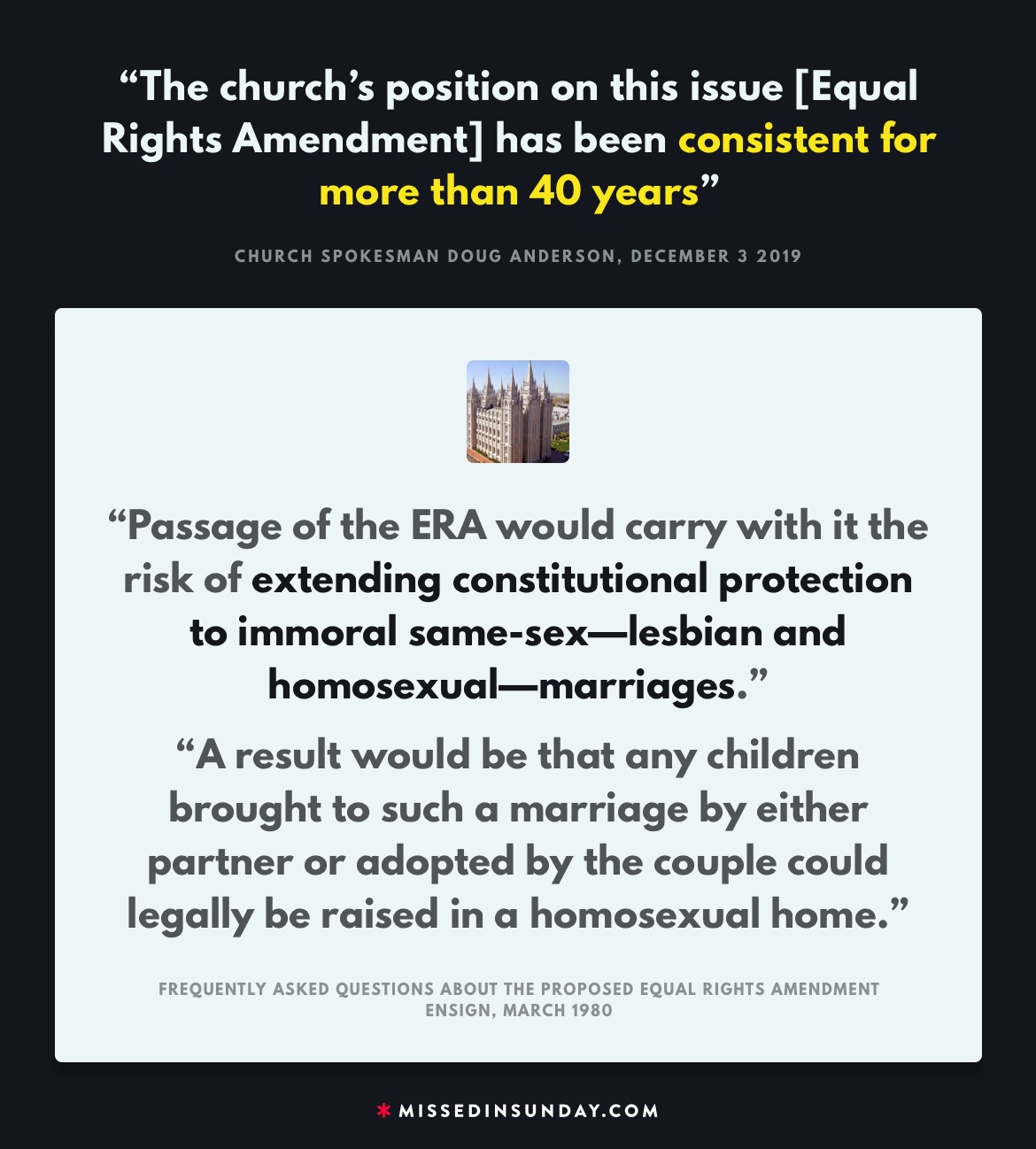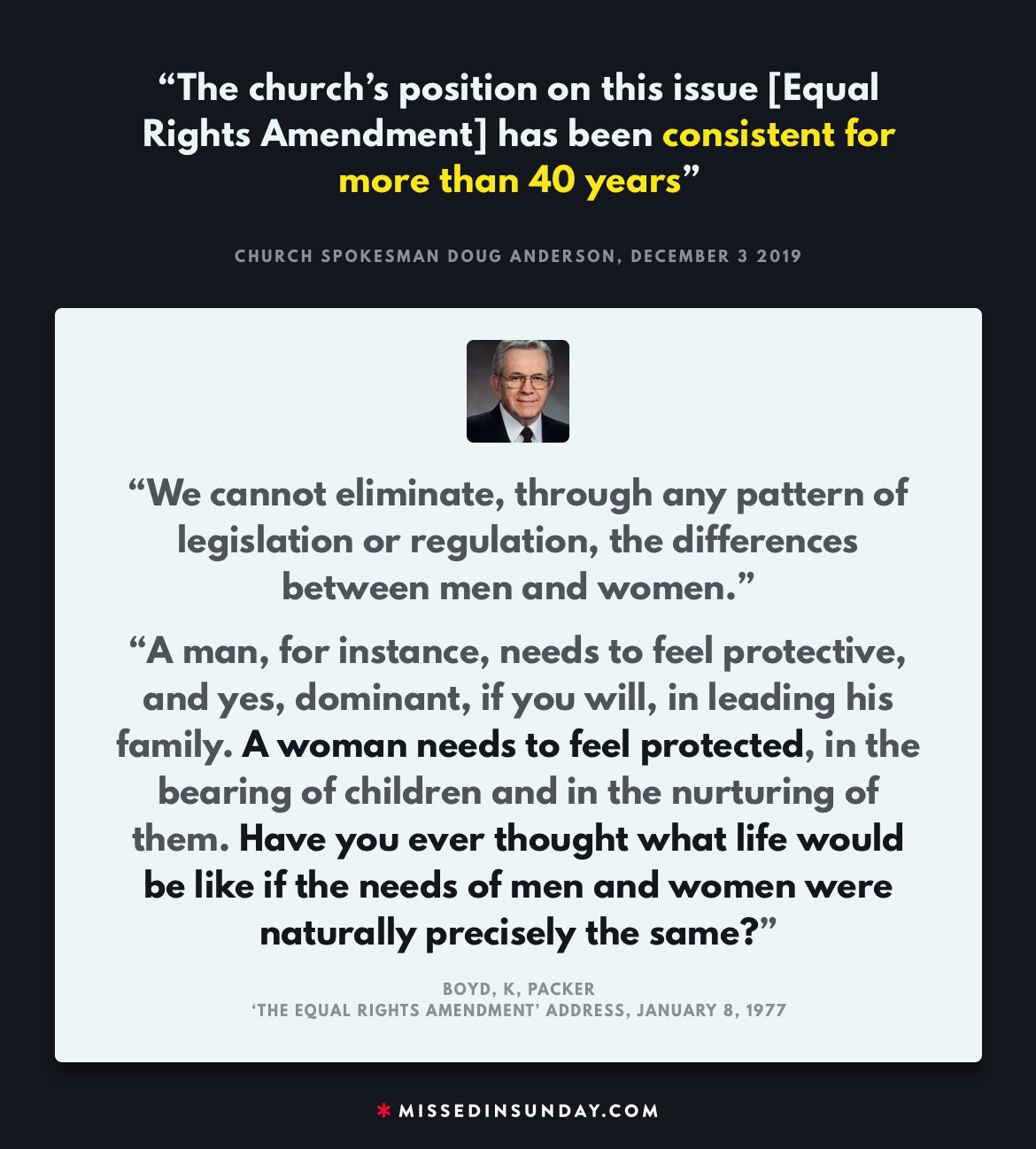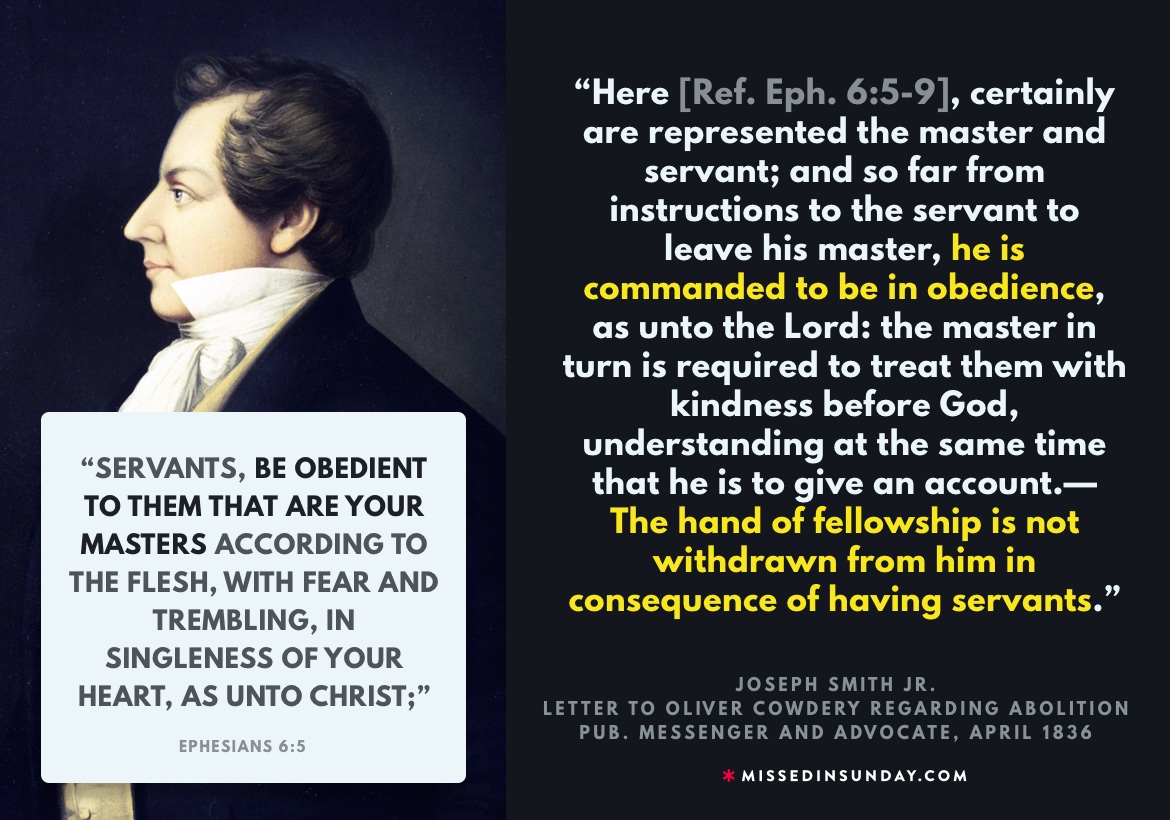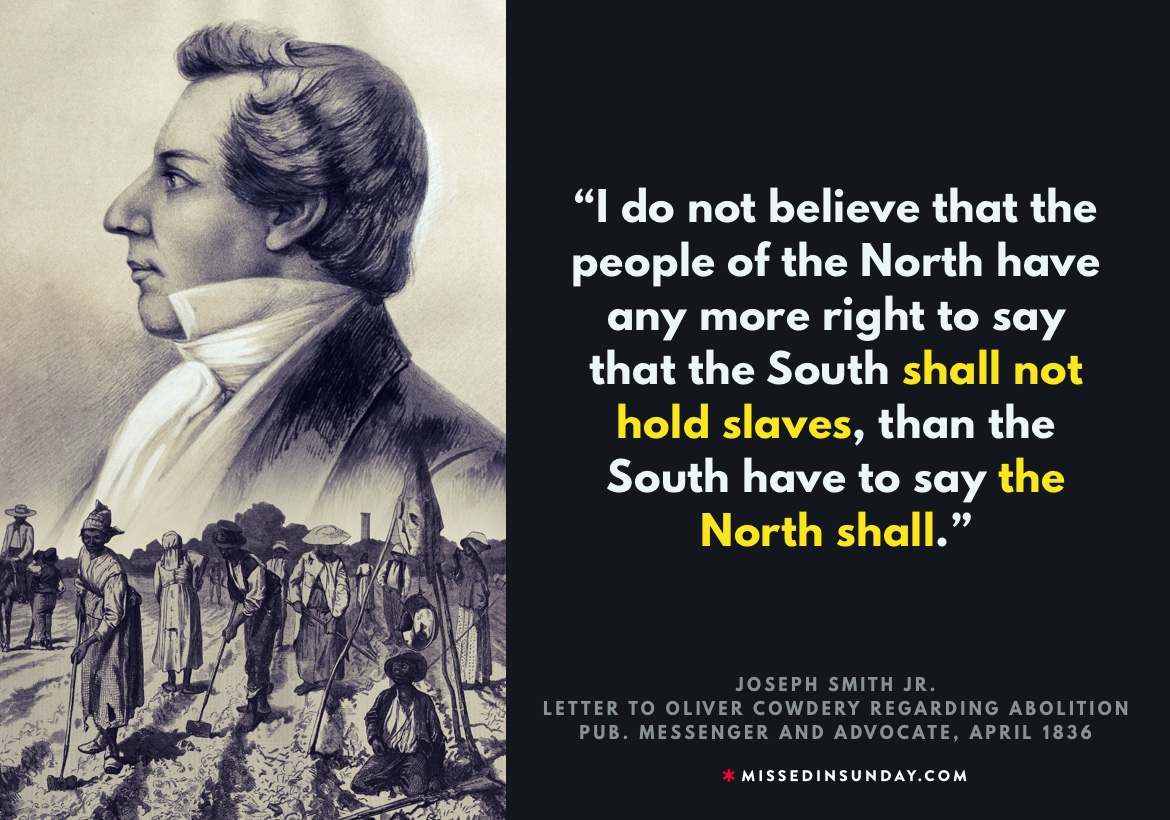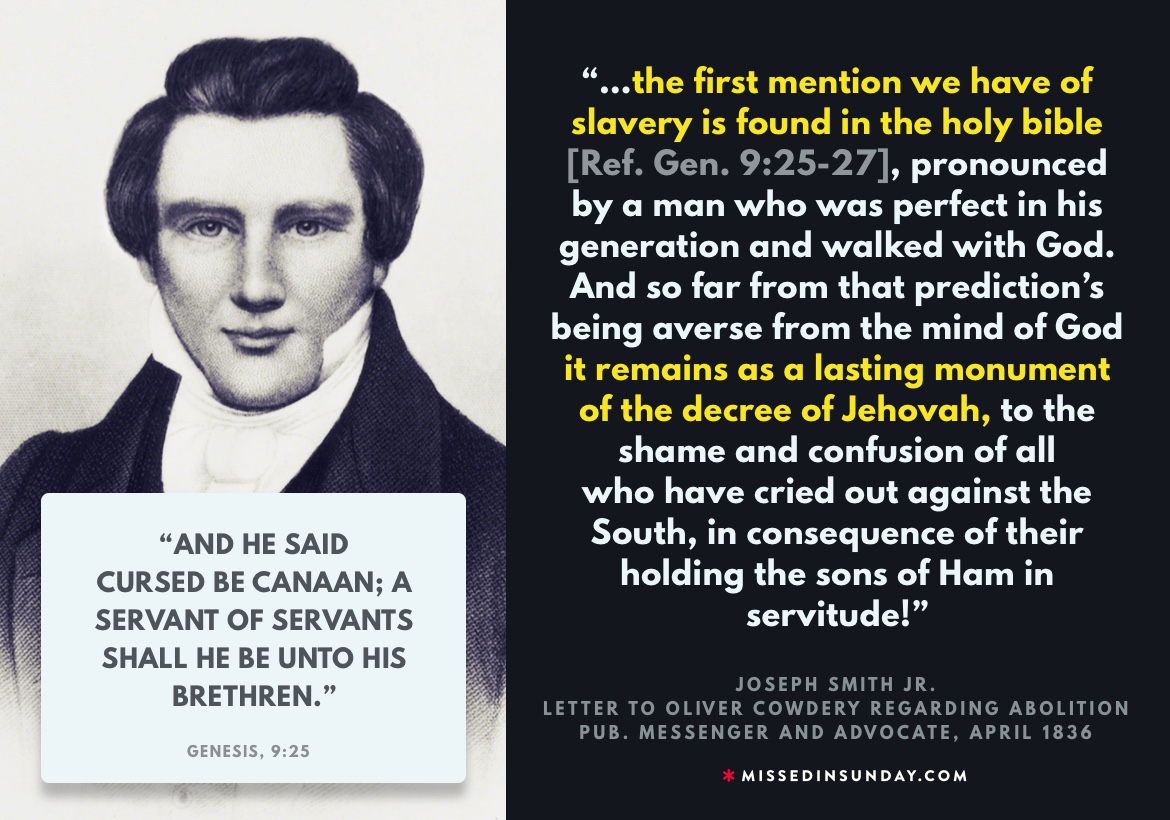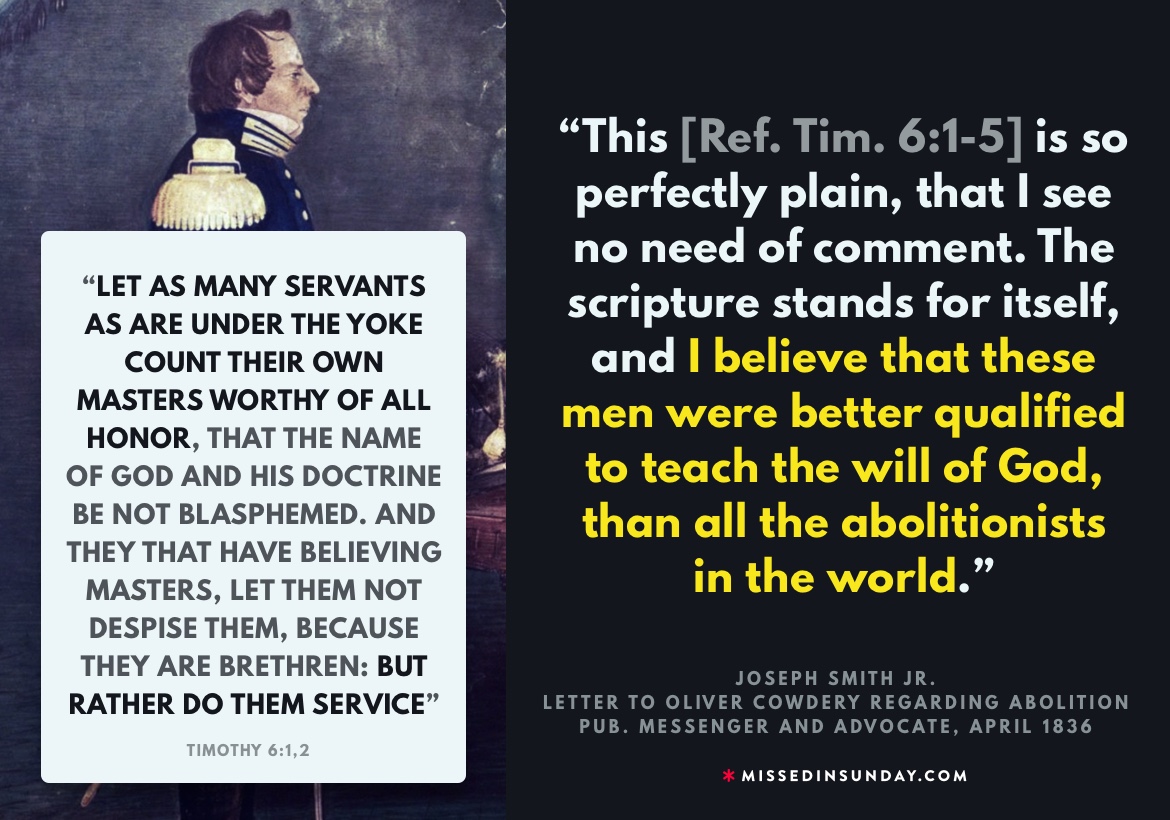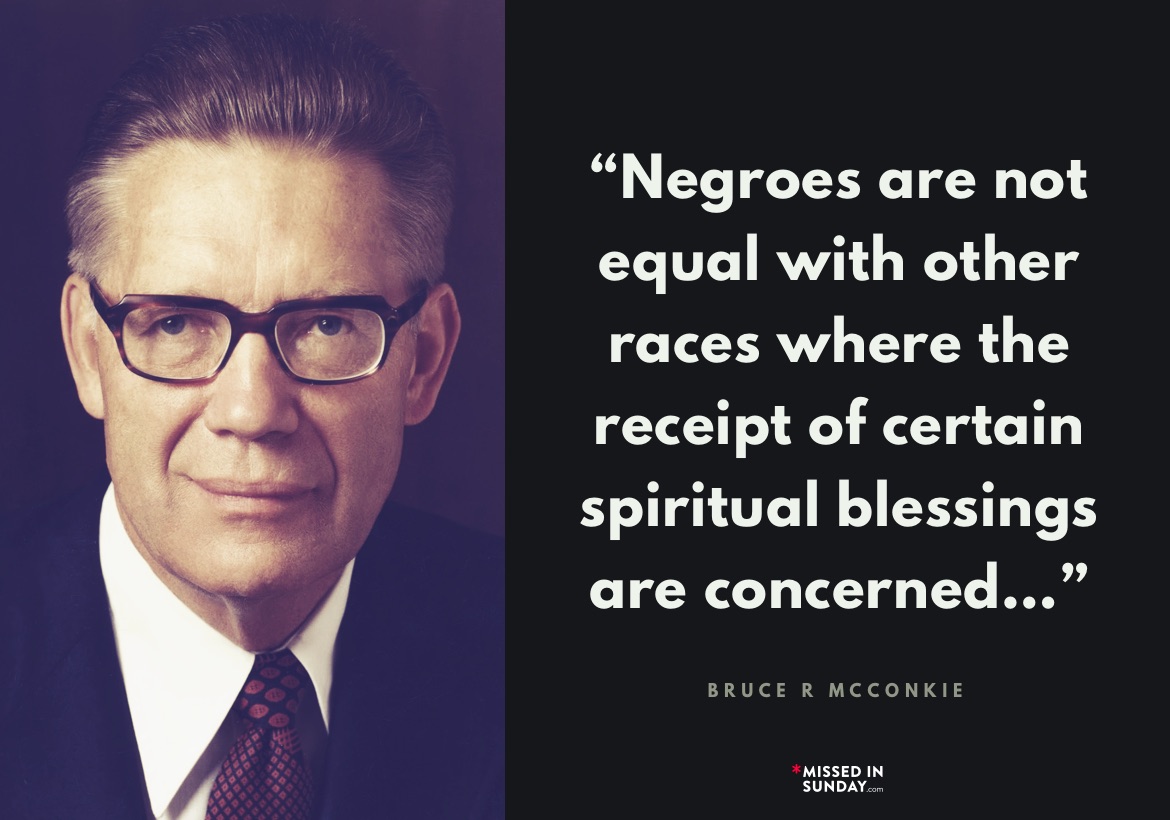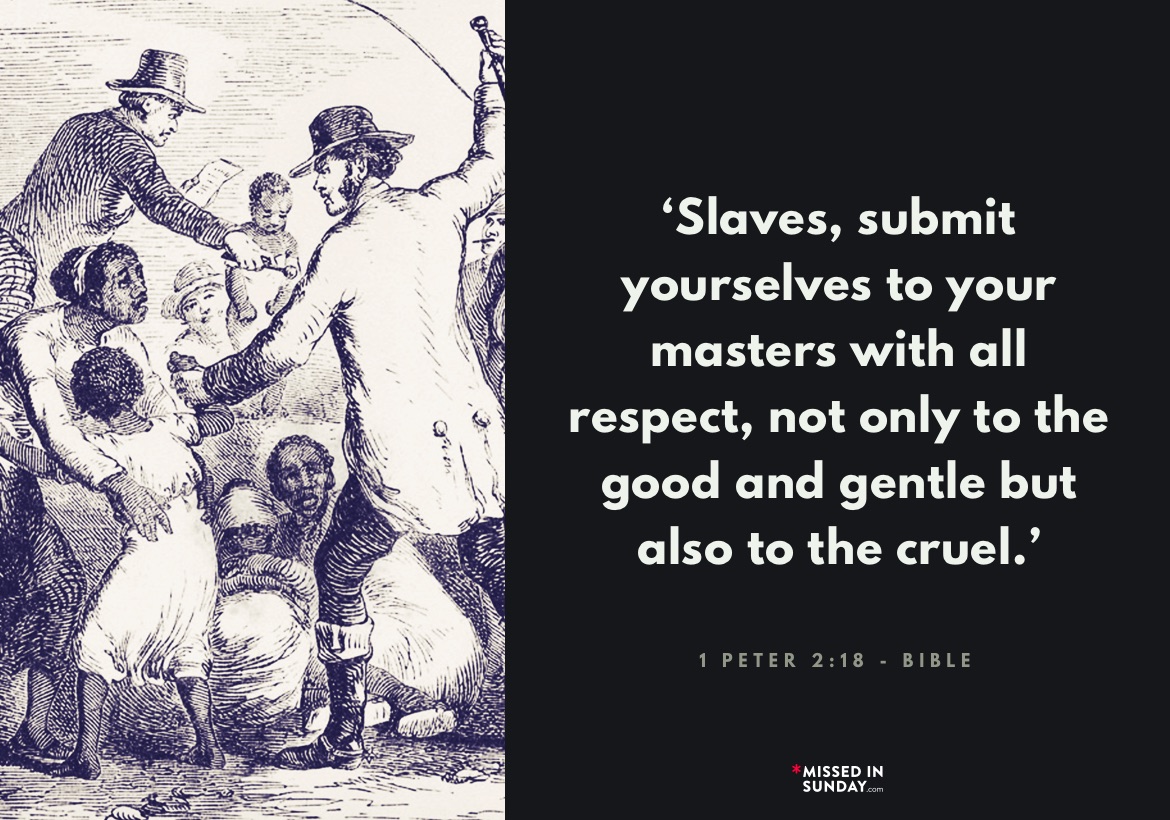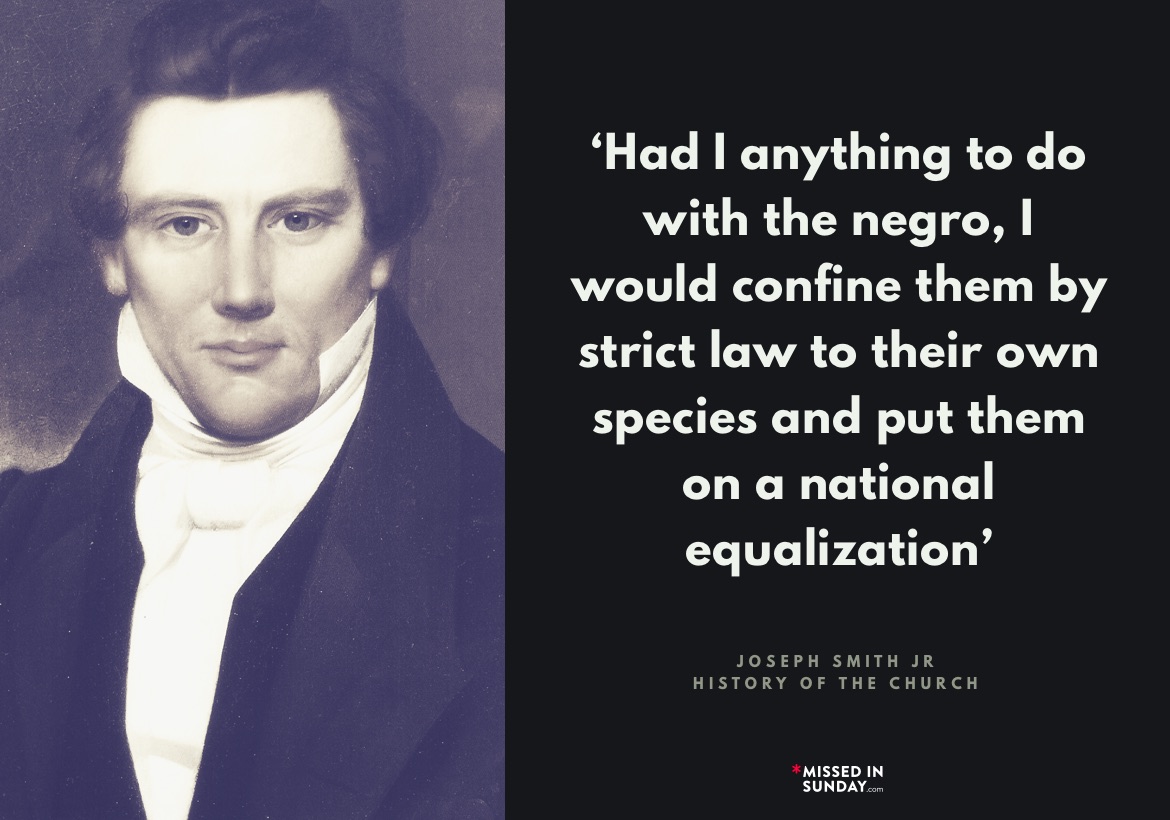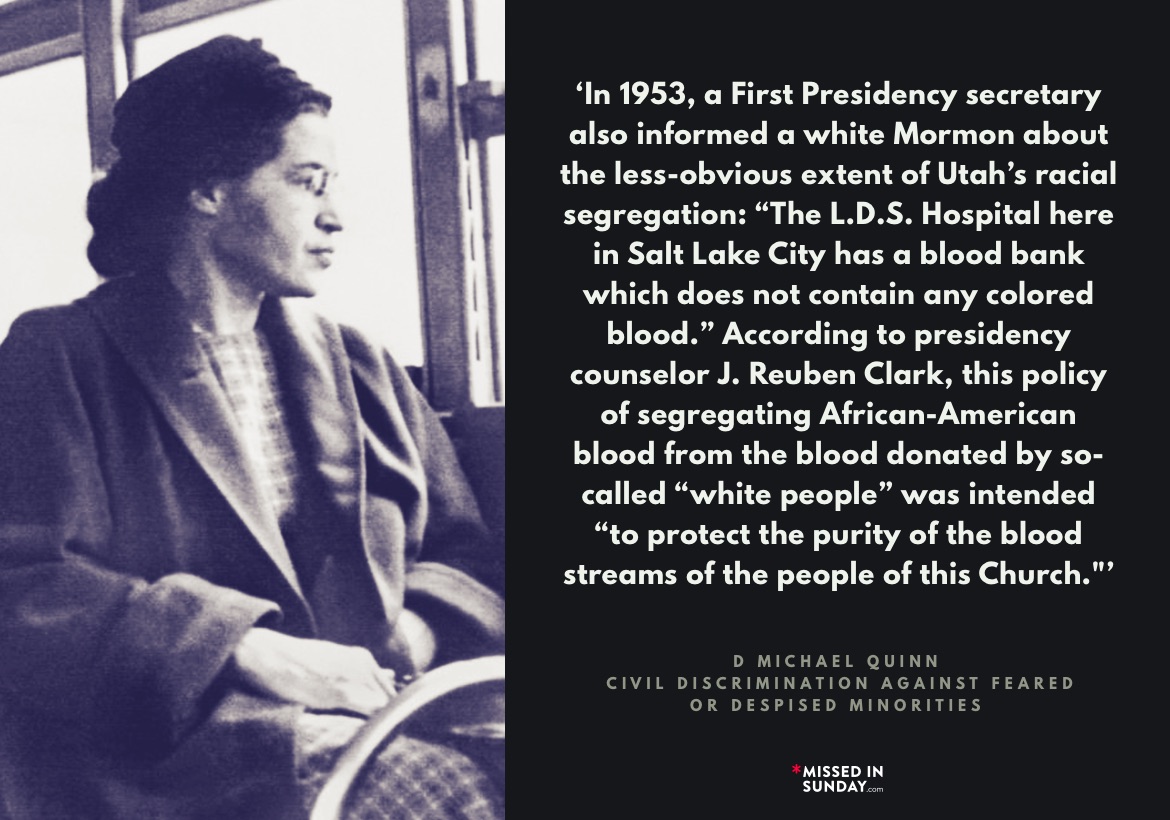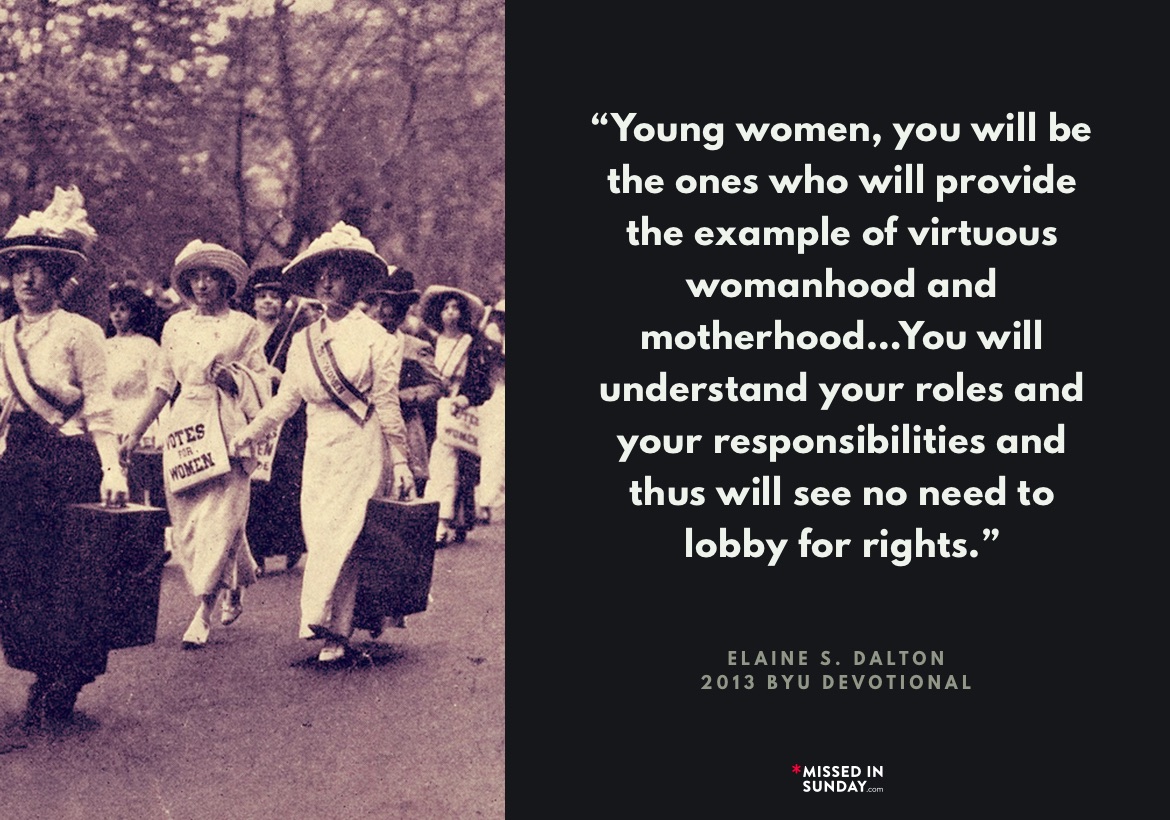Excerpt from an October 2020 General conference talk by Quentin L. Cook:
Letter from Joseph Smith to Oliver Cowdery on abolitionism, published in the ‘Latter Day Saints’ Messenger and Advocate’, Apr. 1836, pp. 289–291:
Brother O[liver] Cowdery:
Dear Sir—This place having recently been visited by a gentleman who advocated the principles or doctrines of those who are called abolitionists; if you deem the following reflections of any service, or think they will have a tendency to correct the opinions of the southern public, relative to the views and sentiments I believe, as an individual, and am able to say, from personal knowledge, are the feelings of others, you are at liberty to give them publicity in the columns of the Advocate. I am prompted to this course in consequence, in one respect, of many elders having gone into the Southern States, besides, there now being many in that country who have already embraced the fulness of the gospel, as revealed through the book of Mormon,—having learned, by experience, that the enemy of truth does not slumber, nor cease his exertions to bias the minds of communities against the servants of the Lord, by stiring up the indignation of men upon all matters of importance or interest.
Thinking, perhaps, that the sound might go out, that “an abolitionist” had held forth several times to this community, and that the public feeling was not aroused to create mobs or disturbances, leaving the impression that all he said was concurred in, and received as gospel and the word of salvation. I am happy to say, that no violence or breach of the public peace was attempted, so far from this, that all except a very few, attended to their own avocations and left the gentleman to hold forth his own arguments to nearly naked walls.
I am aware, that many who profess to preach the gospel, complain against their brethren of the same faith, who reside in the south, and are ready to withdraw the hand of fellowship because they will not renounce the principle of slavery and raise their voice against every thing of the kind. This must be a tender point, and one which should call forth the candid reflection of all men, and especially before they advance in an opposition calculated to lay waste the fair States of the South, and set loose, upon the world a community of people who might peradventure, overrun our country and violate the most sacred principles of human society,—chastity and virtue.
No one will pretend to say, that the people of the free states are as capable of knowing the evils of slavery as those who hold them. If slavery is an evil, who, could we expect, would first learn it? Would the people of the free states, or would the slave states? All must readily admit, that th[e] latter would first learn this fact. If the fact was learned first by those immediately concerned, who would be more capable than they of prescribing a remedy?
And besides, are not those who hold slaves, persons of ability, discernment and candor? Do they not expect to give an account at the bar of God for their conduct in this life? It may, no doubt, with propriety be said, that many who hold slaves live without the fear of God before their eyes, and, the same may be said of many in the free states. Then who is to be the judge in this matter?
So long, then, as those of the free states are not interested in the freedom of the slaves, any other than upon the mere principles of equal rights and of the gospel, and are ready to admit that there are men of piety who reside in the South, who are immediately concerned, and until they complain, and call for assistance, why not cease their clamor, and no further urge the slave to acts of murder, and the master to vigorous discipline, rendering both miserable, and unprepared to pursue that course which might otherwise lead them both to better their condition? I do not believe that the people of the North have any more right to say that the South shall not hold slaves, than the South have to say the North shall.
And further, what benefit will it ever be to the slave for persons to run over the free states, and excite indignation against their masters in the minds of thousands and tens of thousands who understand nothing relative to their circumstances or conditions? I mean particularly those who have never travelled in the South, and scarcely seen a negro in all their life. How any community can ever be excited with the chatter of such persons—boys and others who are too indolent to obtain their living by honest industry, and are incapable of pursuing any occupation of a professional nature, is unaccountable to me. And when I see persons in the free states signing documents against slavery, it is no less, in my mind, than an array of influence, and a declaration of hostilities against the people of the South! What can divide our Union sooner, God only knows!
After having expressed myself so freely upon this subject, I do not doubt but those who have been forward in raising their voice against the South, will cry out against me as being uncharitable, unfeeling and unkind—wholly unacquainted with the gospel of Christ. It is my privilege then, to name certain passages from the bible, and examine the teachings of the ancients upon this matter, as the fact is uncontrovertable, that the first mention we have of slavery is found in the holy bible, pronounced by a man who was perfect in his generation and walked with God. And so far from that prediction’s being averse from the mind of God it remains as a lasting monument of the decree of Jehovah, to the shame and confusion of all who have cried out against the South, in consequence of their holding the sons of Ham in servitude!
“And he said cursed be Canaan; a servant of servants shall he be unto his brethren. And he said, Blessed be the Lord God of Shem; and Canaan shall be his servant.— God shall enlarge Japheth, and he shall dwell in the tents of Shem; and Canaan shall be his servant.”—Gen, 8:25, 26, 27.
Trace the history of the world from this notable event down to this day, and you will find the fulfilment of this singular prophecy. What could have been the design of the Almighty in this wonderful occurrence is not for me to say; but I can say, that the curse is not yet taken off the sons of Canaan, neither will be until it is affected by as great power as caused it to come; and the people who interfere the least with the decrees and purposes of God in this matter, will come under the least condemnation before him; and those who are determined to pursue a course which shows an opposition and a feverish restlessness against the designs of the Lord, will learn, when perhaps it is too late for their own good, that God can do his own work without the aid of those who are not dictated by his counsel.
I must not pass over a notice of the history of Abraham, of whom so much is spoken in the scriptures. If we can credit the account, God conversed with him from time to time, and directed him in the way he should walk, saying, “I am the Almighty God: walk before me and be thou perfect.” Paul says that the gospel was preached to this man. And it is further said, that he had sheep and oxen, men-servants and maid-servants, &c. From this I conclude, that if the principle had been an evil one, in the midst of the communications made to this holy man, he would have been instructed differently. And if he was instructed against holding men-servants and maid-servants, he never ceased to do it; consequently must have incurred the displeasure of the Lord and thereby lost his blessings—which was not the fact.
Some may urge, that the names, man-servant and maid-servant, only mean hired persons who were at liberty to leave their masters or employers at any time. But we can easily settle this point by turning to the history of Abraham’s descendants, when governed by a law given from the mouth of the Lord himself. I know that when an Israelite had been brought into servitude in consequence of debt, or otherwise, at the seventh year he went from the task of his former master or employer; but to no other people or nation was this granted in the law to Israel. And if, after a man had served six years, he did not wish to be free, then the master was to bring him unto the judges, boar his ear with an awl, and that man was “to serve him forever.” The conclusion I draw from this, is that this people were led and governed by revelation and if such a law was wrong God only is to be blamed, and abolitionists are not responsible.
Now, before proceeding any farther, I wish to ask one or two questions:—Were the apostles men of God, and did they preach the gospel? I have no doubt but those who believe the bible will admit these facts, and that they also knew the mind and will of God concerning what they wrote to the churches which they were instrumental in building up.
This being admitted, the matter can be put to rest without much argument, if we look at a few items in the New Testament. Paul says:
“Servants, be obedient to them that are your masters according to the flesh, with fear and trembling, in singleness of your heart, as unto Christ: Not with eye service, as men-pleasers: but as the servants of Christ, doing the will of God from the heart: With good will doing service, as to the Lord, and not to men. Knowing that whatsoever good thing any man doeth, the same shall he receive of the Lord, whether he be bond or free. And, ye masters, do the same things unto them, forbearing threatening: knowing that your Master also is in heaven; neither is there respect of persons with him.” Eph. 6:5, 6, 7, 8, 9.
Here is a lesson which might be profitable for all to learn, and the principle upon which the church was anciently governed, is so plainly set forth, that an eye of truth might see and understand. Here, certainly are represented the master and servant; and so far from instructions to the servant to leave his master, he is commanded to be in obedience, as unto the Lord: the master in turn is required to treat them with kindness before God, understanding at the same time that he is to give an account.— The hand of fellowship is not withdrawn from him in consequence of having servants.
The same wri[t]er, in his first epistle to Timothy, the sixth chapter, and the five first verses, says:
“Let as many servants as are under the yoke count their own masters worthy of all honor, that the name of God and his doctrine be not blasphemed. And they that have believing masters, let them not despise them, because they are brethren: but rather do them service, because they are faithful and beloved, partakers of the benefit These things teach and exhort. If any man teach otherwise, and consent not to wholesome words, even the words of our Lord Jesus Christ, and to the doctrine which is according to godliness: he is proud, knowing nothing but doting about questions and strifes of words, whereof cometh envy, strife, railings, evil surmisings, Perverse disputings of men of corrupt minds, and destitute of the truth, supposing that gain is godliness: from such withdraw thyself.”
This is so perfectly plain, that I see no need of comment. The scripture stands for itself, and I believe that these men were better qualified to teach the will of God, than all the abolitionists in the world.
Before closing this communication, I beg leave to drop a word to the travelling elders: You know, brethren, that great responsibility rests upon you, and that you are accountable to God for all you teach the world. In my opinion, you will do well to search the book of Covenants, in which you will see the belief of the church concerning masters and servants. All men are to be taught to repent; but we have no right to interfere with slaves contrary to the mind and will of their masters. In fact, it would be much better and more prudent, not to preach at all to slaves, until after their masters are converted: and then, teach the master to use them with kindness, remembering that they are accountable to God, and that servants are bound to serve their masters, with singleness of heart, without murmuring. I do, most sincerely hope, that no one who is authorized from this church to preach the gospel, will so far depart from the scripture as to be found stirring up strife and sedition against our brethren of the South. Having spoken frankly and freely, I leave all in the hands of God, who will direct all things for his glory and the accomplishment of his work.
Praying that God may spare you to do much good in this life, I subscribe myself your brother in the Lord.
JOSEPH SMITH, jr.

